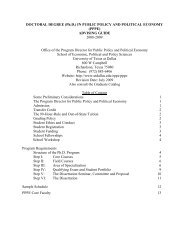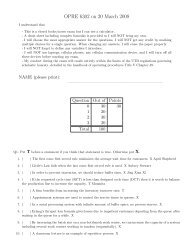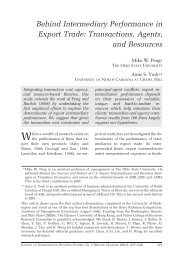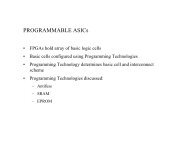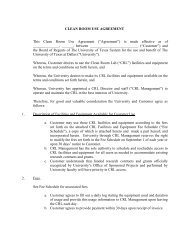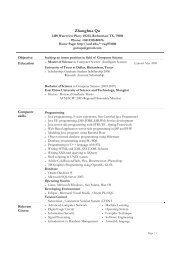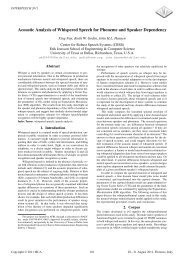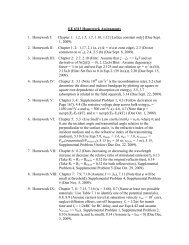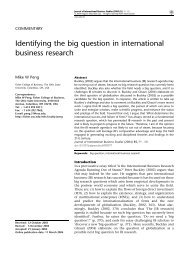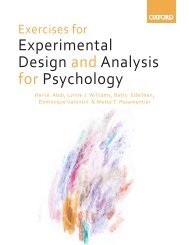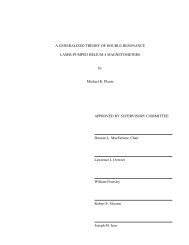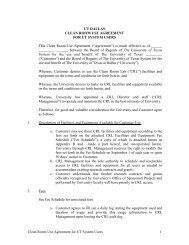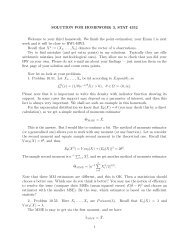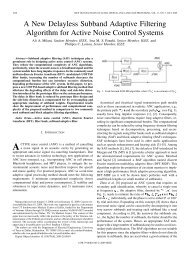My ultimate career goal is to be an academic psychologist ...
My ultimate career goal is to be an academic psychologist ...
My ultimate career goal is to be an academic psychologist ...
Create successful ePaper yourself
Turn your PDF publications into a flip-book with our unique Google optimized e-Paper software.
Application Statement<br />
<strong>My</strong> <strong>ultimate</strong> <strong>career</strong> <strong>goal</strong> <strong>is</strong> <strong>to</strong> <strong>be</strong> <strong>an</strong> <strong>academic</strong> clinical psycholog<strong>is</strong>t conducting research <strong>an</strong>d<br />
teaching at a major university. <strong>My</strong> interest in psychology first <strong>be</strong>g<strong>an</strong> <strong>to</strong> emerge during pre-adolescence<br />
as I <strong>be</strong>g<strong>an</strong> paying close attention <strong>to</strong> the interactions of friends <strong>an</strong>d family. When I started college,<br />
however, several very influential people in my life pushed me <strong>to</strong> major in business rather th<strong>an</strong><br />
psychology <strong>be</strong>cause it prom<strong>is</strong>ed a more lucrative future. After a year <strong>an</strong>d a half in a business program, I<br />
found that I had no real passion for business. After taking a year off <strong>to</strong> work in a law firm, I returned <strong>to</strong><br />
school <strong>an</strong>d <strong>to</strong>ok a seminar class in Lifesp<strong>an</strong> Development with the most motivating <strong>an</strong>d inspiring<br />
professor. With my passion for psychology renewed, I quickly focused on pursuing a <strong>career</strong> in the field.<br />
A num<strong>be</strong>r of different experiences have shaped my research interests. For over a year I have<br />
worked as a research ass<strong>is</strong>t<strong>an</strong>t in Dr. Marion Underwood’s lab. We have <strong>be</strong>en studying <strong>an</strong>ger <strong>an</strong>d<br />
aggression in adolescents’ peer <strong>an</strong>d family relationships. Last summer, we conducted <strong>an</strong> experiment<br />
observing adolescents <strong>an</strong>d their mutually nominated <strong>be</strong>st friend interacting over Inst<strong>an</strong>t Messenger <strong>an</strong>d<br />
face-<strong>to</strong>-face after a mild conflict generated by giving friends moderately negative false feedback. <strong>My</strong><br />
honors thes<strong>is</strong>, which was based on th<strong>is</strong> data, <strong>is</strong> titled “Preadolescents’ Computer Use <strong>an</strong>d the Quality of<br />
their Friendships.” I hypothesized that those who spend more time on the computer at home <strong>an</strong>d on<br />
Inst<strong>an</strong>t Messenger will experience a reduced quality of friendship compared <strong>to</strong> those who spend less<br />
time on the computer <strong>an</strong>d IM. I expected th<strong>is</strong> result <strong>be</strong>cause I think the more time spent online would<br />
me<strong>an</strong> less time for face-<strong>to</strong>-face interaction resulting in a less intimate exch<strong>an</strong>ge <strong>be</strong>tween friends. I<br />
coded <strong>an</strong>d entered the data received from the friendship qualities measure <strong>an</strong>d from questions on the<br />
computer use questionnaire <strong>an</strong>d conducted correlational <strong>an</strong>alyses <strong>to</strong> assess computer use <strong>an</strong>d each<br />
quality. Correlational <strong>an</strong>alyses showed that although time spent on the computer was not clearly<br />
related <strong>to</strong> negative friendship qualities, enjoyment of IM was associated with relational aggression<br />
within friendship, overt aggression within friendship, <strong>an</strong>d exclusivity. I also helped <strong>to</strong> conduct a pilot<br />
study in Dr. Underwood’s lab looking at how a particip<strong>an</strong>t <strong>an</strong>d h<strong>is</strong>/her mutually nominated <strong>be</strong>st friend
<strong>an</strong>d a particip<strong>an</strong>t <strong>an</strong>d h<strong>is</strong>/her primary caregiver relate when given interaction tasks <strong>to</strong> complete. In a<br />
large percentage of the particip<strong>an</strong>ts, social aggression was present in both interactions. It has <strong>be</strong>en<br />
fascinating <strong>to</strong> observe interactions with the purpose of <strong>an</strong>swering specific questions <strong>an</strong>d <strong>to</strong> learn<br />
accurate methods of gathering <strong>an</strong>d <strong>an</strong>alyzing the data. From these experiences I have developed keen<br />
research interests in the influence of peer interactions on children’s social <strong>an</strong>d emotional development,<br />
social aggression exhibited by girls in preadolescence <strong>an</strong>d adolescence, <strong>an</strong>d the growing rate of<br />
depression among adolescents.<br />
<strong>My</strong> clinical interests have grown out of experiences at Children’s Medical Center of Dallas where<br />
I work on the Inpatient Psychiatry Unit as a Milieu Therap<strong>is</strong>t. I have worked at the hospital since the<br />
<strong>be</strong>ginning of July 2002 ass<strong>is</strong>ting in the care of 2- <strong>to</strong> 17-year-olds struggling with bipolar d<strong>is</strong>order,<br />
depression, suicide, eating d<strong>is</strong>orders, <strong>be</strong>havior problems <strong>an</strong>d a myriad of other <strong>is</strong>sues. Th<strong>is</strong> opportunity<br />
<strong>to</strong> work in direct patient care helped me <strong>to</strong> <strong>be</strong>tter define my approach <strong>to</strong> psychology. While children<br />
<strong>an</strong>d adolescents are in the hospital working <strong>to</strong> ch<strong>an</strong>ge their <strong>be</strong>havior <strong>an</strong>d improve their coping skills, we<br />
also work <strong>to</strong> educate their parents about their children’s problems <strong>an</strong>d help them improve their<br />
parenting skills. Working closely with parents has increased my clinical interest in parent-child<br />
interaction as well as marital interaction <strong>an</strong>d how these relationships may contribute <strong>to</strong> maladaptive<br />
functioning in both the parents <strong>an</strong>d their children. Th<strong>is</strong> experience has also increased my research<br />
interest in family interactions. Moreover, although I love clinical aspects of my job, I find myself w<strong>an</strong>ting<br />
<strong>to</strong> find out more about what may contribute <strong>to</strong> certain psychological phenomena such as depression<br />
<strong>an</strong>d how <strong>to</strong> <strong>be</strong>tter help a struggling population.<br />
Duke University’s doc<strong>to</strong>ral program in clinical psychology appears <strong>to</strong> <strong>be</strong> well aligned with my<br />
<strong>goal</strong>s <strong>an</strong>d interests. After investigating doc<strong>to</strong>ral programs in clinical psychology across the country, I<br />
have chosen <strong>to</strong> apply <strong>to</strong> your school for several reasons. First <strong>is</strong> your commitment <strong>to</strong> a multi-system<br />
approach <strong>to</strong> researching psychological phenomena. Second <strong>is</strong> your signific<strong>an</strong>t emphas<strong>is</strong> on research.<br />
Third, are the outst<strong>an</strong>ding faculty mem<strong>be</strong>rs <strong>an</strong>d the match of their research interests with my interests.
Specifically, I am fascinated by Professor Putallaz’s work on parent <strong>an</strong>d peer social systems <strong>an</strong>d how<br />
they influence children’s social competence <strong>an</strong>d social relationships. I am also interested in her research<br />
on social aggression in middle childhood girls. Professor Asher’s research on children’s conflict<br />
responses, studies of peer accept<strong>an</strong>ce <strong>an</strong>d rejection <strong>an</strong>d how th<strong>is</strong> contributes <strong>to</strong> children’s development<br />
of interpersonal skills <strong>is</strong> also very interesting. Finally, I am interested in Professor Curry’s research on<br />
clinically depressed adolescents <strong>an</strong>d effective therapies for treating depression in childhood <strong>an</strong>d<br />
adolescence.



